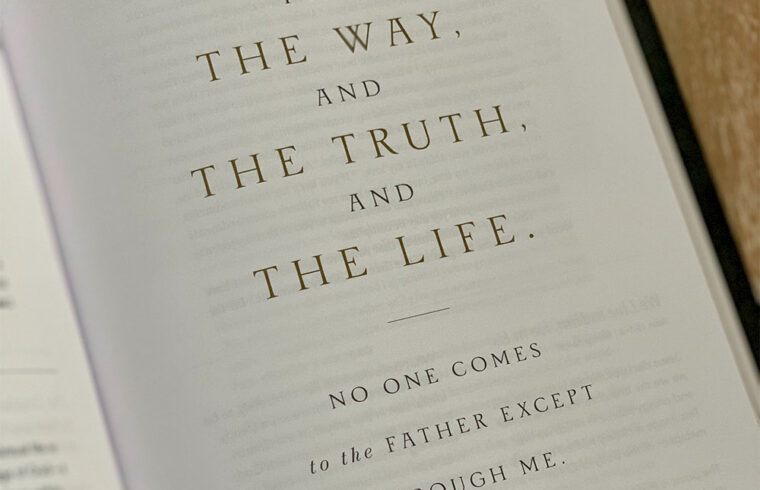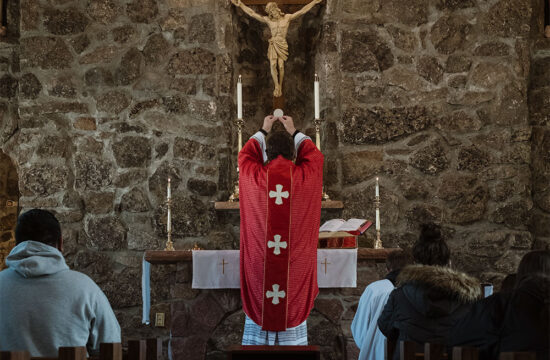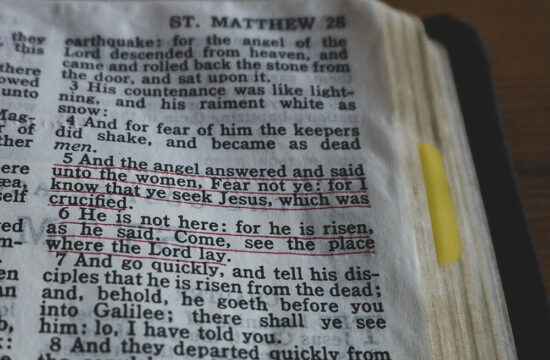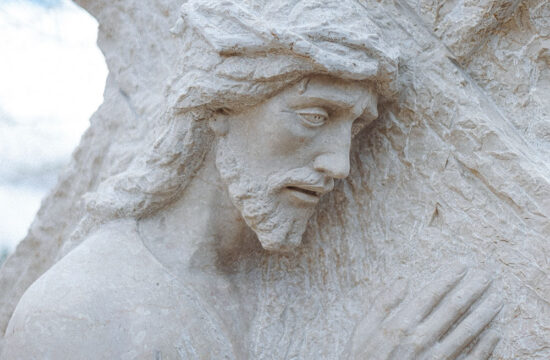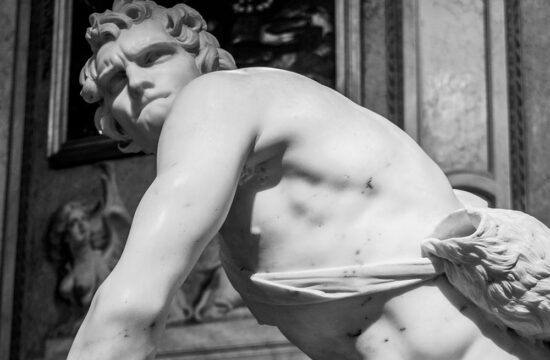DAY 99: John 1-3; Proverbs 5: 1-6
IN THE BEGINNING
I’m curious to hear what everyone else’s experience is reading these first chapters of John after 98 days in the Old Testament. You’ve probably picked up Fr. Mike’s excitement in anticipation of this first Messianic checkpoint that we’re beginning today. I’m sure part of it is as Catholic Christians, there’s excitement in delving into stories and passages we’re more familiar with than those of the Old Testament. It’s also a welcome break after going through some of those difficult books and chapters most recently.
But if I had to guess, Fr. Mike was probably most excited about the fact that we’re jumping into John as our first foray into the New Testament. Why John? Matthew’s gospel is intentionally the first Gospel presented in the New Testament… It was considered almost the “definitive” account in the Early Church. The Gospel of Mark is considered the first written. Luke’s Gospel has a much more historical perspective that ties much of the Old Testament to the life of Christ. Those three gospels – Matthew, Mark and Luke are often called “the Synoptic [greek for “same eye”] Gospels.” Meaning that if you lie them next to each other, there’s a lot of correlation between the stories and narratives. They are in a sense three different witness testimonies that give nuances and differences to events that they witnessed and experienced in the life, death and Resurrection of Jesus Christ.
John is incredibly unique. His Gospel was written the latest and last of the 4. And He writes in a very different style, has things that happened in the life of Christ in a different order and shares other stories and episodes that the Synoptics don’t. Which point to a highly reflective, theological work that is very refined and thorough. Which personally always made this book a bit of a challenge to engage with. Being A.D.D. – I often found myself drawn to Mark who writes with a ferocity and energy that you almost can hear the breathlessness and passion as he has a story to tell.
But the gift of this Bible in a Year study for me was triggered watching “The Chosen” the other evening, which reminded me of an incredible point that I couldn’t believe I hadn’t thought about in probably over 2 decades since I first studied John. Which is how John as he sat down to tell the story of Jesus Christ, he unites the Old and New Testament, repeating the first three words in which the Bible open: In the beginning. It’s more than just a neat literary trick. This is setting the entire tone and perspective from the outset: The brokenness that entered into God’s creation will be healed by Jesus. John from the outset is making it clear who Jesus is by making parallels with Genesis – “God created the heavens and the earth” / “all were made through Him [Jesus] and without Him, nothing came to be.” “God said ‘Let there be light’ / Jesus is revealed as the light – that shines in the darkness, and the darkness has not overcome it… And so on… John will mirror the days of creation with the life of Christ. Jesus is the New-Adam, ushering in a New creation a re-creation of God’s design. Taking our journey so far together walking through the Old Testament, it will be exciting to hear and read how we have a new appreciation for the Gospel of John, and more importantly, what new encounters we will experience ourselves with Jesus Christ.
DAY 100: John 4-6; Proverbs 5: 7-14
SACRAMENTS
One of the thoughts that came to mind listening to Fr. Mike yesterday (as well as Jeff Cavins and Fr Mike’s intro to this Messianic Checkpoint) is the abundance of things to take in as we read through these chapters. I laughed when Fr Mike sounded kind of at a loss with how to deal with the tons of stuff that can pop up just from these few chapters and said something like “just take in what you can…”
That’s not a cop-out. It’s highlighting the point that they were making about how Jesus fulfills the Old Testament. He’s not just checking off boxes of different expectations people had for the Messiah – He’s blowing those expectations up and showing up and out in so many ways that it’s hard to take it all in. For example – these three chapters – we hear some of the most beloved stories in the Gospel of John. Every third year in lent, we read the story of the Woman of Samaria at the well… the story of the man in Jerusalem healed near the pools of Siloam… Jesus walking on the Sea, the feeding of the five thousands with loaves and fish which turns into the “Bread of Life discourse.” Each of those chapters contain layers of things to focus on. For simplicity sake, I’ll just point out how Catholic these chapters are in sharing biblical foundations to two of our Sacraments. Look at how in so many of those stories we see how water is a significant part of the way that brings people into relationship with Jesus – which is precisely what Baptism does. The feeding of the 5,000 occurs as Passover is approaching and then Jesus even more explicitly talks about the need to eat His flesh and drink His blood – which couldn’t be more clearly references to the Eucharist.
Think of how much water featured in our Old Testament journey – creation, noah, exodus, water from the rock in the desert wanderings… All of those stories are echoed in these stories in some shape or form… All of these stories are our stories as we experienced Baptism, and as we go into our churches and bless ourselves with Holy Water, it brings all of those things together in a personal encounter for you with Jesus Christ as you recall your Baptism.
Think of how the bread from heaven, the manna in the desert – how it was both a sign and a reality of God nourishing and providing for His people… how it went from something miraculous to something ordinary that became unappreciated… that Jesus performs the miracle of loaves and fishes which significantly caught the crowds attention but only momentarily… The next day when Jesus is trying to open their minds and hearts to receiving Him, they’re not as interested. John tells us some leave “no longer to walk with Him.” All of these stories become real and present as Jesus becomes real and present in the Eucharist at Mass… as we approach that altar and hear “The Body of Christ” – the miracle of Galilee, the truth spoken in the Bread of Life discourse -is there asking us, does our “Amen” truly mean “Yes Lord, I believe.”
This is what we mean when we say “The Word of God is alive and active.” Let yourself be overwhelmed with the abundance of God’s goodness, not just in these beloved scriptures but here and now in our day, our time and space, in our lives…
DAY 101: John 7-9 Proverbs 5: 15-23
SINS, STONES & MERCY
In these three chapters, we encounter sections that – aside from the two dramatic stories of the woman caught in adultery and the curing of the Man born blind – probably were not as familiar as most of the Gospel of John has been so far. Even if you are a daily Mass goer, these are sections where there’s more debates that go on, there’s ongoing threats and accusations, there’s even sections that the lectionary doesn’t cover – (more for clarity and out of a desire to make a reading more understandable to the congregations).
One thought that came to mind reading through these passages is how much Jesus emphasizes the importance of not sinning. Sadly so many people have a mistaken notion taking half teachings of Jesus for their own purposes. For example, how often when a moral debate arises, will we hear someone say: “Let him who is without sin among you be the first to throw a stone at her…” Forgetting that the final words Jesus says to the woman is “do not sin again.” And how Jesus emphasizes over and over the importance of not sinning, of not believing the “father of lies” – (aka the devil), and reiterating that a true disciple is the one who listens to God’s word, of following His commandments.
What we are seeing is again, the fulfillment of the Old Testament. So far in the 100 days that preceded this, we often saw God’s punishments for sins being announced and experienced in real time. And as we have discussed, especially early on, that was part of God’s “taming and training” of a people in a broken, uncivilized world who were being set apart as “Chosen People” to be a light to all nations. Which in many ways it had.
But one negative repercussion has been some usurping of God’s authority and judgment and some distorted understandings of God’s activity in the world. So when this bloodthirsty mob throws an adulterous woman before Jesus ready to kill her – conveniently forgetting the man involved – it was obvious that they were not concerned with the sacredness of the marital vow but looking for an opportunity to execute punishment and hopefully to put Jesus into a camp – either agreeing with them (and the Law) or putting Himself in opposition to both. For us, who know and believe Jesus is God – we see the ludicrousness of the “test” and can appreciate how God is able to still uphold the law, while reading the true intentions of the mobs hearts.
Similarly in the healing of the Blind Man, and the amazing debate that unfolds around this man – the distorted notion that either the man or his family must have sinned which is what caused the blindness… and then the fact that he is healed is somehow seen as being diabolical, shows again the real blindness wasn’t the physical handicap of the one man, but the spiritual one held by so many around him.
In all of these, the overriding thing isn’t just an emphasis on avoiding sin, repenting of sin, but also in the gentleness of Jesus, in His healing, in His speaking truth to “authorities” which doesn’t excuse any evil, but also demonstrates that love is more powerful, He is unleashing God’s mercy in a generous, obvious way. Unfortunately the lesson will be lost on many in First Century Jerusalem & Galilee. But not among His most faithful and devout of followers – then and now.
DAY 102: John 10-12; Proverbs 6: 1-5
GOOD SHEPHERD INDEED
It’s interesting to recognize that while I’ve often found the Gospel of John the hardest to enter into (at least prior to this year I would have said that) – there are so many things that come from John that are personally incredibly meaningful to me. When a priest is preparing for his ordination, he usually prepares a holy card to distribute to the guests as a reminder – not just of the day, but hopefully for their prayers. For my prayer card, the scripture reference that resonated the most was from John 3: 30, when John the Baptist recognizes Jesus and utters: He must increase, while I must decrease. The image for the front (which I’m sharing here) is of Jesus as the Good Shepherd which has him as “the suffering servant” (which is evidenced by the crown of thorns) – both images that come from John.
Coming upon those scriptures in the last few days in rapid succession as we have has been moving on many levels. Especially so soon after we’ve delved into the Pentateuch as we have, just hearing Jesus say in the scriptures today “when I am lifted up from the earth” and remembering Moses with the serpent is moving. God has gone from using a bronze image of a creature to taking that place Himself as the source of healing and life for humanity.
That vulnerability is even more revealed in the shortest scripture verse in the entirety of the Old and New Testament John 11: 35: Jesus wept. Two short words that most certainly echo throughout all time and space. To imagine God himself being moved to his core that he weeps over just one of his “creatures.”
The notion of a shepherd protecting, rescuing, fighting and even dying for a weak animal is both courageous and heart warming indeed – that we could appreciate that imagery and find it speaking to us. But to weep reveals the depths of love, care and intimate concern that Jesus has – revealing even greater depths about who He is… Weeping implies a depth of emotion and feeling that says more than words could ever convey: He sees us. He loves us.
Which is what makes Jesus, a Good Shepherd indeed.
DAY 103: John 13-15; Proverbs 6: 6-11
TRUE FRIENDSHIP
“Behold I make a covenant. Before all your people I will do marvels, such as have not been wrought in all the earth or in any nation…” Those words aren’t from John – they come from Exodus (34:10). As we enter into the Upper Room, as we enter into the heart of Jesus in these passages, that’s what came to mind. After Jesus has washed his disciples feet… After He has identified his betrayer – Jesus announces the beginning of the Paschal mystery which He is entering into as He announces “Now is the Son of Man glorified, and in Him, God is glorified
Think back to how many times God had announced He was doing something new, something historic, something truly life-changing that we’ve encountered in the Old Testament so far in these last 100 days. The Israelites standing before the Red Sea with Pharaoh and his armies closing in on them. Or in the book of Numbers, when they were hungry for food, thirsting in the wilderness. Or marching around the walls of Jericho for 7 days in silence wondering what is God up to? There’s that moments between belief and unbelief. That moment of decision between faith and despair where the people themselves are not sure which side they are going to fall on
That upper room, after such intimate of a meal, with Jesus bearing his heart in such an intimate way with those who are no longer just followers, students, disciples, but friends – As He speaks of glory, it’s that moment between belief and unbelief once again. These Jewish men, centuries removed from their ancestors experiences and having that history of reflection – as well as having God incarnate before them are hearing this proclamation themselves. They who ate and whose feet were lovingly grasped and cleansed by God Himself are hearing these words, but naive or blind or confused about all that He has said… all that He has done. They don’t realize what’s about to come or on what side of this moment the vast majority of them will fall.
Yet beautifully, they share the story as is. There’s no re-writing or editing of things. There’s no explanations or excuses to somehow mitigate what’s to come. The brutality of Jesus passion and death, the collective failure and individual failures on the Apostles parts are all to come. And in that, Jesus is indeed glorified. And the failures become the opportunity for the beauty of Jesus’ Mercy to be known, understood and felt in a way that no parable could have ever done for them. And in that, Jesus demonstrates what He means when He calls them – and you and I – His friend.
DAY 104: John 16-18; Proverbs 6: 12-15
PETER: SORROW TO JOY
Reading the Passion of Jesus Christ less than 2 weeks after we as a Church did so (as we do every year) on Good Friday was very reflective. It’s been amazing for me to see how the Holy Spirit moves in re-reading and hearing the scriptures. Different things, events, individuals – who all may be familiar in one way or another stand out in a new light. For example, Fr Mike’s reflections on Judas yesterday were quite revelatory: that Judas being one of the 12, living with these men for over 2 years, it’s strange that they didn’t have even a guess as to who might be the one Jesus predicted would betray Him. That perhaps Judas had this “secret life” interiorly. Had never really thought of that in those terms before.
Similarly, today’s readings – Peter emerges a bit differently. Back in John 13 when Peter promises he would follow Jesus wherever He would go, that he would lay down his life for Jesus only to be told that very soon, Peter will even deny knowing who He is. That’s always such an unsettling moment, isn’t it? You can almost imagine the shock, the disbelief for Peter as he hears this dire prediction. In Peter’s heart of hearts you can imagine there’s sadness, anger, even determination to prove Jesus wrong. Which is what we saw in the garden of Gethsemane. As Judas’ betrayal is fully revealed and the guards come to arrest Jesus, Peter’s heart and mind go back to Peter’s standard mode of operation: acting on his impulse, almost out of instinct. Peter musters courage in that moment and mounts a fight, cutting off the ear of one of the guard’s slaves. You can feel the immensity of the moment. And in a flash, Jesus stops Peter, fraternally corrects him (yet again); and submits to this unjust arrest
The confusion of the whole thing had to have completely unnerved Peter. You can imagine the questions, the doubts, the fear, the anger of the moment. What is happening? How could Judas have done this? Why wouldn’t Jesus let me stop them? What have I done, following Him these last years? As Peter is lost in his thoughts – a nameless individual (in a night where many similar nameless folk seem quite victorious as evil is well on the march) – asks “weren’t you with Him?” “You’re one of those followers, aren’t you?” The impulsive, instinct – the feelings of this moment of confusion, disappointment, fear – he loses his senses, his nerve, his courage. Probably meaning it more as a deflection than an outright denial, maybe not even reflecting on the question being asked, he fails in devastating fashion.
The beauty of John’s narrative is that He captures Jesus’ sayings conveying more than one meaning. As Jesus predicts His passion, He also promises peace, He promises “overcoming the world”, He promises that sorrow will turn into joy. Those are things that not only will Jesus experience, but everyone of his followers… including Peter. That reality will take time for him to recognize. But when the hot headed fisherman, allows the Lord to re-order his mind and heart and actually comes to believe, he not only will experience that sorrow into joy – but will be able to proclaim that as the first Pope… and will ultimately suffer the same torturous death that Jesus did.
From denying, to dying – the journey to admit Jesus as the Christ to the world took a lot of twists and turns in Peter’s life. Today I’m reflecting on my failures and successes in the same… what drives my fears? How do I overcome them?
DAY 105: John 19-21; Proverbs 6: 16-22
KING OF THE JEWS
Think back to a little over a month ago. Back then when we encountered this mysterious person Ballam, one of the most bizarre things other than his hitting a donkey who then started talking to him, was that this non-Jewish who wasn’t by any stretch of an imagination a good or holy individual, had the ability to speak with God and that God was able to use him to send a message to His people of love and care for His people.
As we enter these last chapters of John at the close of this Messianic checkpoint, that came to mind. That God uses another non-Jewish individual who wasn’t by any stretch of an imagination a good or holy individual: Pontius Pilate. The twists and turns of this unjust arrest, humiliation, trial are probably most familiar to Catholic Christians. We know of Pilate’s reluctance to give into the crazed mobs unhinged demands that Jesus be crucified. We hear again how Pilate tries every loophole and ways to get out of it. We can surmise fear, indifference, abject cowardice as reasons for his going along with the sick desire for blood.
As Jesus leaves Pilate’s writing and placing on the cross “Jesus of Nazareth, the King of the Jews” is noteworthy. Pilate has made it clear he’s not a Jew and not vaguely interested in their laws. Pilate’s conceding to this evil demand was more about keeping the Jews settled and under control. Which by the way was maintaining the status quo with the “legal” King of the Jews, Herod
Is he trying to embarrass the Jews that he just placated? Is he trying to humiliate them as an innocent man dies and a robber/murderer/insurrectionist – all around criminal named Barrabas is walking the streets? Is he trying to incite the Jews by taunting them in this way? “Do not write ‘The King of the Jews’ but that ‘This man said I am King of the Jews.’” They note the distinction and Pilate’s “What I have written, I have written” leaves it vague.
Like Ballam, Pilate probably felt some twinge of courage to have written what he had written. Perhaps sensing not only the truth that he argued he was clueless of, but imagining that with the death of the King of the Jews, the Jewish people themselves would also be done, and Rome would have one less obstacle to deal with.
Yet, as we’ve seen, God can use jackasses to completely upend, confuse and confound the world before – and will do so in even more definitive way. The King of the Jews will suffer this cruel fate, and utterly destroy death… His reign will far surpass the grandest of hopes mere mortals dared to imagine… His Kingdom will gather peoples of all times, all nations into an eternity, ruled under the embodiment of truth, peace and love… And His chosen people who once again turned away from yet another covenant will find their healing, restoration, reconciliation in Him who they spurned…
It’s with that in mind that we can turn back to the Old Testament tomorrow hearing the foreshadowing of this coronation in the next section “Royal Kingdom.”

